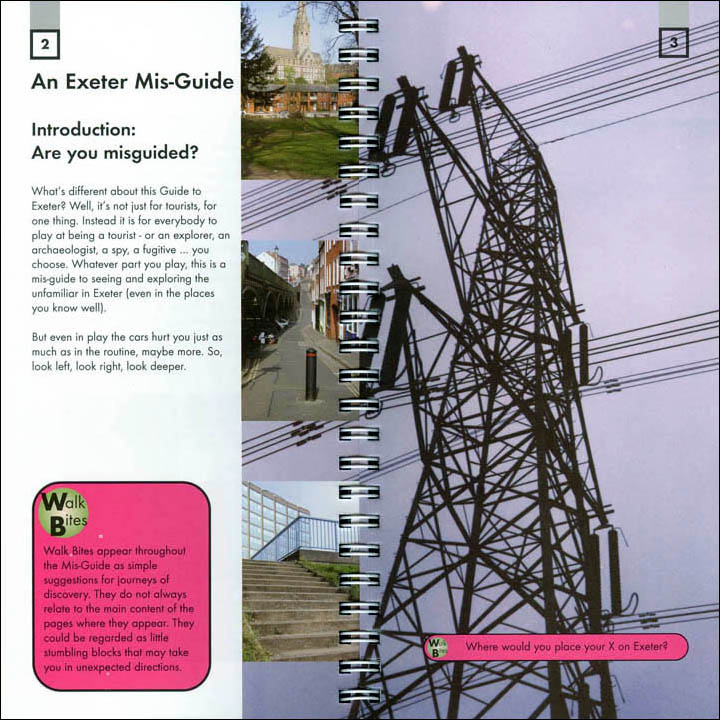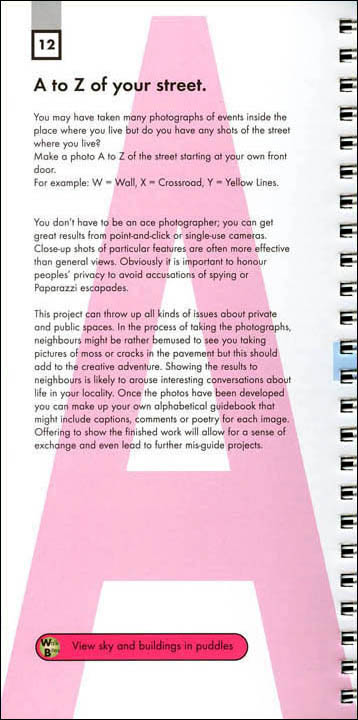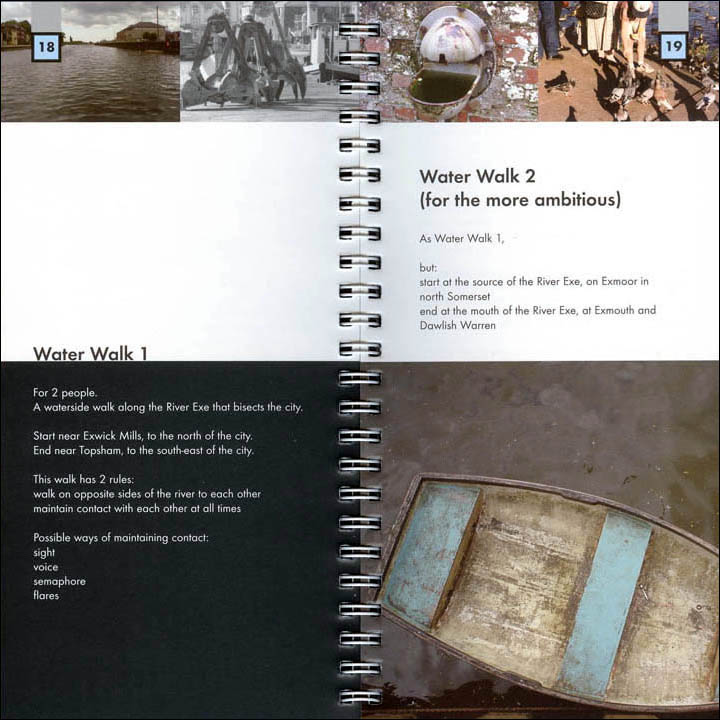Reconstruction 5.1 (Winter 2005)
Return to Contents »
Stephen Hodge, Simon Persighetti, Phil Smith, Cathy Turner, and Tony Weaver. An Exeter Mis-Guide. Wrights & Sites, 2003.
<1> Trudging through the Michigan snow in the middle of January, as big puffs of hot breath leave crystals on my beard, I sometimes lose sight of the pleasures of walking. My attention, instead, fixed on some far off place: a door to a building that I pray isn't locked, an alcove to duck into away from the wind, a car hidden beneath a hump of snow. The beautiful gift of mobility is reduced to mere preoccupation with the end, the process getting there is forgotten, or, worse, scorned. At this moment, my subjectivity is displaced by my objectives. But as the Exeter Mis-Guide reminds me, such rationality is not a life-sentence.

<2> The typical role of a guide is to provide access to the "important" places in a particular city or region. The sites covered are circumscribed by a larger system of cultural meanings, and the tourist guide provides an alternative topology to the work-a-day paths that are worn into the pavement by those who work and live there. For example, on a trip to Los Angeles one might overlook the millions who live and work in, say, the city's vast service economy. Instead, following a map of the "Stars' Homes" or taking a trek down the star-studded walkways of Hollywood Boulevard. A trip to Golden, Colorado is more typically marked by a trip to the Coors Brewery than to the Colorado School of Mines. A holiday in Jamaica might involve snorkeling at Club Med, but rarely involves a trek through Trenchtown.

<3> On the other hand, the leisured class has also made great sport of slumming. Alternative guides can offer exciting opportunities to touch the seedy side of the city. Sex tourists and divebar hipsters can enjoy the pleasures of strategic advantages in wealth and transportation, adding flavor to lives made plain by their own overabundance of access. As if reality gets further away as one's socioeconomic grasp stretches. I was worried, at first, that the Mis-Guide might err in this direction.

<4> Instead, I found something stunning in its lack pretension:
When you walk through the crowds on Exeter High Street -- in fact when you walk anywhere -- your brain doesn't "see" all the details of buildings or people you pass. The world's too full of complicated things for your brain to deal with them all consciously. What you actually "see" is an "optic flow" -- the important patterns and details, the crucial information such as "can I step over that?" Or "is that too steep?"
Next time you're walking down the High Street use your "optic flow" to enjoy the patterns of buildings and people eddying and rushing by. (4)
The organizing principle of this guide is not the exploration of specific and finite spaces, but to encourage all people to think differently about the cities in which they live. The goal of the Mis-Guide is not so much to lead you to specific destinations in the city of Exeter, rather it is to encourage people to find themselves and each other.
<5> Some of the walks include "City Planner 1," which advises readers to walk down a street and redesign it, recording alternate layouts, color schemes, and buildings. In addition, the writers suggest modifying postcards of the city with the addition of new features. The "Nostalgic Drift (for those who know the City well)" suggests:
Revisit scenes from your past and see how they're getting along without you. Look into the back gardens of houses you used to inhabit. Commemorate in chalk special places on the pavement where you said "Goodbye" or had a memorable conversation, or kissed. Lay a wreath on the site of a memory you want to put to rest. (37)
The "Walk For Exhibitionists or Reality-TV-show Wannabes" advocates putting on a show for Closed Circuit Television Cameras.

<6> The Mis-Guide succeeds by putting into writing small strategies, or jumping-off points, that seek to stimulate creativity in a society that seems to prefer spoon-fed entertainments and over-the-top spectacles. The graciousness with which this enterprising group of walking artists (Stephen Hodge, Simon Persighetti, Phil Smith, Cathy Turner, and Tony Weaver) have invited us to do more than just admire, but to create art ourselves and rediscover the social function of the city, is truly an accomplishment. While it might not be necessary to buy a guide to experience such walking ourselves, the engaging spirit of playfulness and the abundance of good ideas contained within its covers are surely are irresistible in their charm. I do not live in Exeter, but after reading the Mis-Guide, I will think twice before I make the same joyless hump through the streets of my town. And I just hope that I might get lost in the pleasures of walking along the way.
ISSN: 1547-4348. All material contained within this site is copyrighted by the identified author. If no author is identified in relation to content, that content is © Reconstruction, 2002-2016.
